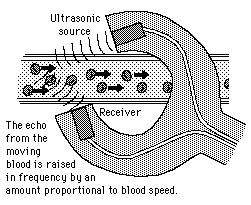Doppler Pulse Probe
The pulse of a premature infant may be very difficult to detect with a stethoscope since the sound produced is extremely faint. A sensitive Doppler pulse probe can be used to advantage because it detects the movement of the blood through an artery. The ultrasonic echo from the moving blood can be mixed with the source frequency to
produce a beat frequency. As the
blood surges with the pumping action
of the heart, the beat frequency
signal changes in frequency and
amplitude.
|
Remarkably, in clinical
Doppler pulse detectors the sound
output is similar in nature to what
you hear with a stethoscope; you
immediately recognize it as a
pulse sound.
|
 |
|
Index
Traveling wave concepts
Doppler concepts |

